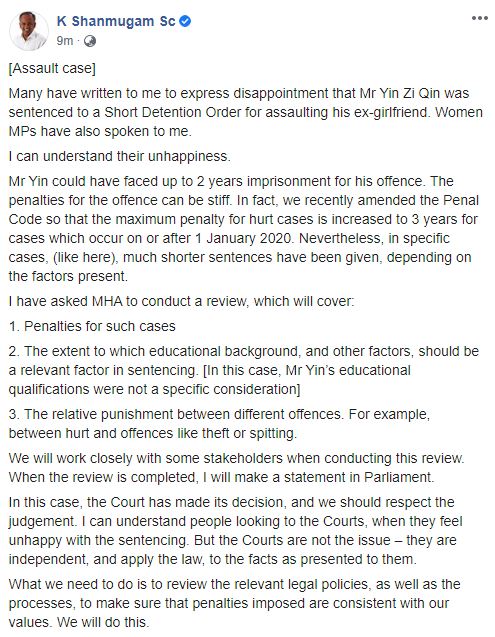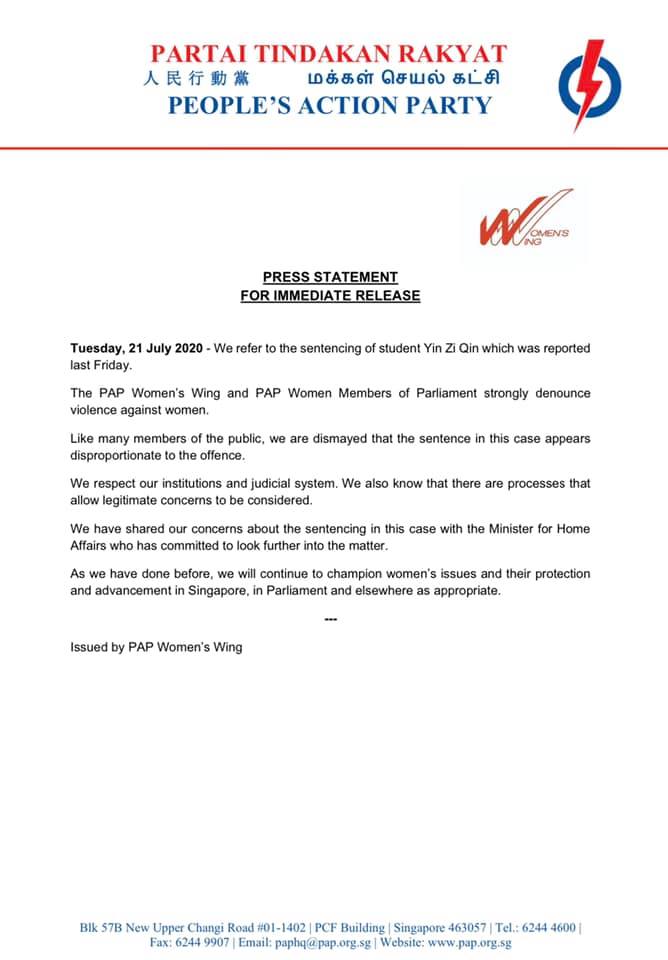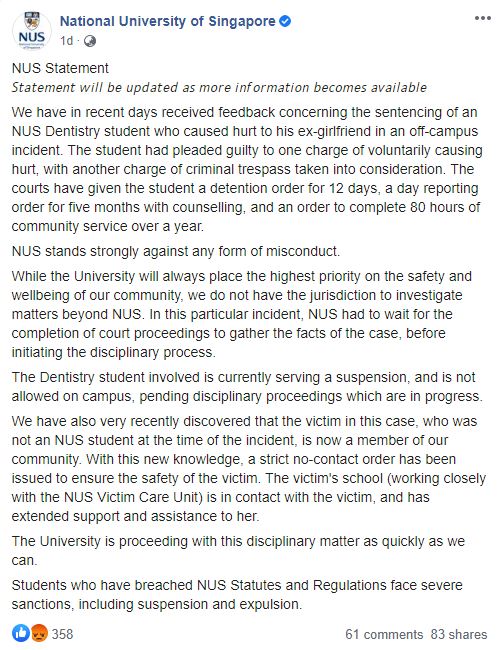NUS Student’s Sentence Perceived To Be Too Lenient, Shanmugam Says Will Review Penalty Framework
The case of the National University of Singapore (NUS) student who strangled his ex-girlfriend has inflamed the public once more over the perceived inadequate sentencing of offenders from good schools.
23-year-old Yin Zi Qin was sentenced to 12 days’ detention, counselling and community service, but will have no criminal record — leaving many raging over the lenient punishment.
The public uproar has prompted Home & Law Minister K. Shanmugam to tell the Ministry of Home Affairs (MHA) to look into the matter. He said a review will be conducted over how educational background affects the sentencing for certain criminal cases.

Shanmugam understands unhappiness
In a Facebook post on Tuesday (21 Jul), Mr Shanmugam acknowledged the disappointment from the public on this matter, and he “understands their unhappiness”.
He also noted that Yin could have faced up to 2 years’ jail.

Thus, the MHA review will focus on 3 aspects:
- The penalties for similar cases
- How much the offender’s background, including educational background, will be taken into consideration when penalties are meted out
- A comparison of the penalties in such cases with the penalties for other offences
The aim is to ensure “penalties imposed are consistent with our values”, he said.
He added that he would speak in Parliament about the review when it was done.
Don’t blame court, judges
While Mr Shanmugam said Yin’s educational qualifications were not a specific consideration in this case, he added the court or judges are not to be blamed when the sentencing in cases are unsatisfactory, as they are not the issue.
It’s worth noting that in the court judgement, Yin was deemed not to be at high risk of reoffending.
The judge also took into consideration Yin’s relative youth, lack of previous convictions and prospects of rehabilitation, saying that this made it viable for him to undergo a community-based sentence.
However, in an earlier Zoom meeting with the media, Mr Shanmugam said it should be the framework of the law pertaining to such cases that needs to be looked into, adding,
We need to deal with this as a matter of policy.

Image by MS News
PAP Women’s Wing dismayed over sentence
Mr Shanmugam may have been prompted to look into this issue by a statement from the People’s Action Party (PAP) Women’s Wing issued on Tuesday (21 Jul).

In the statement, the PAP Women’s Wing said it was “dismayed” that Yin’s sentence “appears disproportionate to the offence”.
It also said it had shared its concerns to the Minister for Home Affairs, i.e. Mr Shanmugam, and he has committed to look into it.
NUS suspends offender
Separately, NUS has also reacted by suspending Yin.
In a Facebook post on Monday (20 Jul), the university said that he is not allowed to be on campus.
It has also initiated disciplinary proceedings against him, which it said could not be done until court proceedings were completed.
NUS student strangled ex, pressed his thumb into her eye
According to a report on the case from Channel NewsAsia (CNA), the victim, 21, broke up with Yin in May 2019.
He then entered the premises of the victim’s compound using an access card she’d given him. When the victim returned home, Yin tried to convince her to not break up, but when that failed, he strangled her after saying he was upset.
When she screamed, he pressed his thumb into her eye, causing bleeding. Eventually, she blacked out.
However, the victim’s stepfather saw Yin and pinned him to the ground, and police were called.
Victim suffered psychological trauma
The victim was sent to hospital, where she was given 3 weeks’ medical leave. She also suffered an eye infection that took 5 months to heal, and had to wear an eye patch.
While she wasn’t an NUS student at the time of the incident, she’s an NUS student now. Thus, she’s reported paranoia over potentially bumping into Yin in school, and suffers from insomnia as well as nightmares of him attacking her in her room.
The paranoia has also spread to her family, as her family members check that windows and doors in their house are locked every night.
Outrage compounded by other similar incidents
The outrage over Yin’s sentence is likely compounded when considered that there have been other cases where NUS students who committed offences received punishments that were perceived to be too lenient.
Take for example, NUS voyeur Nicholas Lim, who sparked outrage when he received a 12-month conditional warning from the police and had to write a letter of apology after peeping at a fellow student in the shower. That’s compared with the 10-week jail term a Republic Polytechnic student got for filming girls in the shower.
Or molester Terence Siow, who was given 21-month probation for molesting a woman on the MRT as the judge found that he has the “potential to excel in life” given his good grades.
Time to address concern over perceived lenient sentences for some
While the sentencing for each case before the courts is decided on its own facts, recent cases of university students offending has shone the spotlight on how they have been sentenced.
As such, there’s been growing concern among the public over sentences that appear to be disproportionately lenient considering the offence.
This may lead to a perception that those with good grades or in good schools can get away with more than others.
Thus, while public perception shouldn’t be the sole factor to decide how the law is applied, the MHA review is timely to address this issue before public concern mounts.
Featured image from MS News and Facebook.










